Lecture 15: How to Manage
第15讲:如何管理公司
第15讲课程视频
![图片[1]_Lecture 15: How to Manage 第15讲:如何管理公司_繁木网](http://fanmu.com/wp-content/uploads/2021/12/Y-Combinator.jpg)
讨论地址:http://www.huomen.com/topic-show-id-103.html
When Sam originally sent an email for me to do this course, he said “Ben can you teach a fifty minute course on management?” And I immediately thought to myself, “Wow, I just wrote a three hundred page book on management. So that book was entirely too long.”
当山姆最初给我发邮件让我上这门课时,他说:“本,你能教一门50分钟的管理课程吗?”我立刻对自己说:“哇,我刚刚写了一本三百页的管理书。所以那本书太长了。”
I didn’t actually have time to collapse the three hundred pages into fifty minutes. Like Mark Twain, I didn’t have time to write a good short letter, so I’m going to write a long letter. But in this case, I am going to teach exactly one management concept.
我没有时间把这三百页纸压缩成五十分钟。像马克吐温一样,我没有时间写一封好的短信,所以我要写一封长信。但在这种情况下,我要教一个管理理念。
I see CEO’s mess up this one management concept more consistently than anything else. From when they’re very, very early to when they’re very, very big as a company. It’s the easiest thing to say and the most difficult to master. The concept in musical form is from Sly and the Family Stone. “Sometimes I’m right and I can be wrong. My beliefs are in my song. No difference what group I’m in.”
我看到首席执行官把这一管理理念搞得一团糟,比其他任何东西都要始终如一。从他们非常,非常早的时候到他们作为一家公司非常,非常大的时候。这是最容易说的,也是最难掌握的。音乐形式的概念来源于《斯莱与家族之石》有时我是对的,也可能是错的。我的信仰在我的歌里。我在哪一组没什么区别。”
That’s the musical version of today’s lesson. For those of you who are musical, you can leave now.
这是今天课的音乐版本。对于你们这些音乐爱好者,你们现在可以离开了。
When you’re making a critical decision, you have to understand how it’s going to be interpreted from all points of view. Not just your point of view and not just the person you’re talking to but the people who aren’t in the room, everybody else. In other words, you have to be able, when making critical decisions, to see the decision through the eyes of the company as a whole. You have to add up every employee’s view and then incorporate that into your own view. Otherwise your management decisions are going to have weird side effects and potentially dangerous consequences. It’s a hard thing to do because at the point when you are making a decision, you’re often under a great deal of pressure.
当你在做一个关键的决定时,你必须理解如何从各个角度来解释它。不只是你的观点,不只是你谈话的人,还有不在房间里的人,其他人。换言之,在做出关键决策时,你必须能够从整个公司的角度来看待决策。你必须把每个员工的观点加起来,然后把它纳入你自己的观点。否则,你的管理决策将产生奇怪的副作用和潜在的危险后果。这是一件很难做的事情,因为在你做决定的时候,你经常面临很大的压力。
Let’s get into the agenda. I am going to cover four cases. First, I am going to cover demotions, which are very emotional. Then raises, which are also emotional. Then we are going to evaluate one of Sam’s blog posts, which is news to Sam. I figured I’d tease him since he invited me to do a fifty minute management class after I wrote a three hundred page book.
我们进入议程吧。我要处理四个案子。首先,我要报道降职,这是非常情绪化的。然后加薪,这也是情绪化的。然后我们将评估萨姆的一篇博客文章,这对萨姆来说是新闻。我想我会取笑他,因为我写了一本三百页的书之后,他邀请我去上五十分钟的管理课。
Then I’m going to talk about history’s greatest practitioner at this, I’m wearing a shirt with him on it, and how he used it to do something that nobody had ever done and has ever done since in human history. Basically complete mastery of the technique I am going to talk about.
然后我要谈谈历史上最伟大的实践者,我穿着一件衬衫,上面有他,他是如何用它来做一些人类历史上从来没有人做过的事情。基本上完全掌握了我要讲的技术。
So, first business example, you’ve got an executive, and do you demote or do you fire him? This comes from an actual conversation, an actual real life situation that I was working on with a CEO. The basic situation was this: he had a great executive he had hired. He was working harder than anybody else in the company and was doing everything he was supposed to. Everybody liked him because he worked so hard and was a generally a smart person, but he was in over his head knowledge-wise. He did not have the knowledge and the skills to do what the company needed him to do or really compete against the competition. So he couldn’t actually keep him in the job, but he was a great guy. So the question is, should I fire this person or can I just move him into a lower role and bring in a person above him. That would be cool. Let’s look at how you make that decision.
所以,第一个商业例子,你有一个主管,你是降职还是解雇他?这来自于一次真实的对话,一次我和一位首席执行官一起工作的真实生活。基本情况是这样的:他雇了一位出色的执行官。他比公司里任何人都努力工作,做了他该做的一切。每个人都喜欢他,因为他工作很努力,而且是一个聪明的人,但他知识渊博。他没有足够的知识和技能去做公司需要他做的事情,也没有足够的能力与竞争对手抗衡。所以他不能让他继续工作,但他是个好人。所以问题是,我应该解雇这个人,还是我可以把他调到一个较低的职位,让一个人在他之上。那太酷了。让我们看看你是怎么做决定的。
You are, in this case, the CEO. It’s really hard if somebody comes to work every day at six AM, is working until ten PM, and is working harder than anybody in the company. It’s really hard to just say, “Well sorry, nice effort but you don’t get an A for an effort. You get an F because I fired you.”
在这种情况下,你就是首席执行官。如果有人每天早上六点来上班,一直工作到晚上十点,而且比公司里任何人都努力,那真的很难。真的很难说,“对不起,很好的努力,但你没有得到一个A的努力。因为我炒了你,所以你得了F。”
Nobody wants to have that conversation. A demotion is kind of neat because from a CEO’s point of view, he can keep him in the company. He works so hard. He’s a great example of somebody who gives great effort. He’s got a lot of friends in the company, so from a cultural stand point it’s a win/win because he gets to stay. Then I can bring in somebody who can solve my problem but I don’t have to create another problem.
没人想谈这个。降职有点巧妙,因为从CEO的角度来看,他可以让自己留在公司。他工作很努力。他是一个非常努力的人的典范。他在公司里有很多朋友,所以从文化的角度来说,这是双赢的,因为他可以留下来。然后我可以找人来解决我的问题,但我不必再制造问题。
If you think about it from the executive’s perspective, it’s like, “I don’t want to be demoted but I really don’t want to be fired because if I get fired, that’s a way harder more complicated thing to explain to my next employer that I got demoted. Getting demoted is, well I didn’t really get demoted. I got a new job, a smaller title.”
如果你从高管的角度来考虑,你会觉得,“我不想被降职,但我真的不想被炒鱿鱼,因为如果我被炒鱿鱼,要向我的下一个雇主解释我被降职的原因就更难了。被降职是,我并不是真的被降职了。我得到了一份新工作,一个较小的头衔。”
The last thing it enables, theoretically: the company values all of our employees. We brought you in. We made a commitment to you as an employee and it will enable you to keep growing with the company. This was the conversation I was having with the CEO and I said, “Well, wait a minute. Let me ask you this. What’s the equity package that this executive has?” He goes, “Well, what do you mean?” I was like, “Well I would like to see direct level of compensation? Does he get a Vice President level of compensation? Does he have 1.5%? Does he have 0.4%?”
从理论上讲,它所能做的最后一件事是:公司重视我们所有的员工。我们把你带进来了。作为一名员工,我们对您做出了承诺,这将使您能够与公司一起不断成长。这是我和首席执行官的谈话,我说,“好吧,等一下。我来问你这个。这位高管有什么股权方案?”他说,“你什么意思?”我想,“好吧,我想看看直接的补偿水平?他有副总裁级别的报酬吗?他有1.5%吗?他有0.4%吗?”
That gave the CEO pause. He’s like, “Well, he does have 1.5% of the fully-diluted equity of the company.” And I was like, “Ok. So you’re an engineer in your company. How do you feel about somebody who used to be the head of sales who brought in with 1.5%? What do your engineers get? Do they get 0.1% of the company? 0.2%? What are they getting at this point? How are they going to feel about somebody who is NOT the Head of Sales with one point five percent of the company?” And he was like, ” Uh oh.” And I was like, “Yeah! Uh oh. Because how fair is that? Are you going to take the equity away? Are you up to do that? Are you up to go back and take back his compensation? How productive do you think he’ll be if you take away his compensation? Secondly, will people give him the same respect now that you’ve demoted him? Because they knew him as this and now he’s that. “I knew you when you were Head of Sales now you’re the Regional Manager and you’re telling me what the f*** to do? You’re telling me I need to make that call? It seems to me you got demoted. Who are you to talk to me? I am the up and comer. I am going to be the next VP of Sales at the company.”
这让首席执行官停顿了一下。他说,“嗯,他确实拥有公司1.5%的完全稀释的股权。”我说,“好吧。所以你是你公司的工程师。你对一个曾经是销售主管的人拿了1.5%的收入有什么看法?你的工程师得到什么?他们得到公司0.1%的股份吗?0.2%? 他们现在得到了什么?对于一个不是销售主管却拥有公司1.5%股份的人,他们会有什么样的感受?”他说,“哦。”我说,“是啊!哦哦。因为这有多公平?你要把股权拿走吗?你能这么做吗?你要回去拿回他的补偿金吗?如果你拿走他的报酬,你认为他会有多大的生产力?第二,人们会给予他同样的尊重吗?因为他们知道他是这个,现在他是那个。”你当销售主管的时候我就认识你,现在你是区域经理,你要告诉我f***该怎么做?你是说我需要打那个电话?在我看来你被降职了。你是谁要和我说话?我是后起之秀。我将成为公司下一任销售副总裁。”
All these things come into play. When you look at the end, you may think you are dealing with one person. You may think that this is a demotion or a firing of one person. What does it mean according to that one person? But what you are really doing is saying, what does it mean to fail on the job? Particularly the highest paid, the highest compensated job in the company from an equity standpoint. And then, what’s required to maintain your equity? Is it good enough to put in an effort or do you have to get a result? In different situations at different levels, the answers will be different. If this had been a person who was not an Executive brought in from the outside, but someone you promoted past where they should have been and didn’t ever get that equity, maybe you make a different decision but you have to understand what it’s going to mean to everybody, not just the person you’re talking to.
所有这些都起作用了。当你看结尾时,你可能认为你在和一个人打交道。你可能认为这是降职或解雇一个人。根据那个人的说法是什么意思?但你真正想说的是,在工作中失败意味着什么?尤其是从公平的角度来看,公司里薪水最高、报酬最高的工作。那么,你需要什么来维持你的权益呢?你需要付出努力还是一定要得到结果?在不同层次的不同情境中,答案会有所不同。如果这个人不是一个从外部引进的高管,而是一个你提拔的人,而不是一个他们本该去的地方,却没有得到公平待遇的人,也许你会做出不同的决定,但你必须明白这对每个人都意味着什么,而不仅仅是对你谈话的人。
Example two: An excellent employee asks for a raise. A good employee, this isn’t like the last employee. First thing you think is they’re really good, they asked me for a raise, they didn’t ask me for no reason. They asked me because they think they deserve it. I want to retain them. I want to be fair! They’ve done a great job. I know that if I give them this raise, it’s going to be all love coming my way. If I give you a raise we’re good. You got a raise! It’s awesome.
例二:优秀员工要求加薪。一个好员工,这不像上一个员工。首先你觉得他们真的很好,他们要求我加薪,他们没有无缘无故地要求我。他们问我是因为他们认为他们活该。我想留住他们。我要公平!他们做得很好。我知道,如果我给他们加薪,我会得到所有的爱。如果我给你加薪我们就好了。你加薪了!太棒了。
From your perspective you know what you want to do when somebody asks you for a raise. What about from their perspective? How would they take it if you gave them the raise. You have to remember, for them to get to point where they ask you for a raise, they did not wake up one morning and say, “I am going in and asking him for a raise.” This is something they’ve thought about a lot. They’ve compared their other options. They may have an offer from another company. It’s something their spouse probably has been talking to them about. It’s a serious thing. If you give it to them, they’re very likely to feel very good about it. They may be paranoid, like ” Why you giving me a raise?” But very unlikely. Much more they’ll feel like…
从你的角度来看,当有人要求你加薪时,你知道你想做什么。从他们的角度看呢?如果你给他们加薪,他们会怎么接受。你必须记住,为了让他们达到要求你加薪的地步,他们没有在一天早上醒来时说,“我要进去要求他加薪。”这是他们考虑了很多的事情。他们比较了其他的选择。他们可能收到另一家公司的报价。这可能是他们的配偶一直在和他们谈论的事情。这是一件严肃的事情。如果你给他们,他们很可能会觉得很好。他们可能有点偏执,比如“你为什么给我加薪?”但可能性不大。他们会觉得。。。
(Plays “The Shmoney Dance” video)
(播放“金钱之舞”视频)
For those who don’t know, that’s Bobby Shmurda and Rowdy Rebel doing the Shmoney Dance. That’s the reaction you’ll get. So there is a lot of momentum to say, “Yes look. You know they’ve read Sheryl’s book. They’ve leaned in and I’m going to reward them for doing all that.”
对那些不知道的人来说,那是鲍比·什穆尔达和罗迪·雷贝尔在跳“什莫尼之舞”。这就是你会得到的反应。所以有很大的动力说,“是的,看。你知道他们读过谢丽尔的书。他们已经靠进去了,我要奖励他们所做的一切。”
By the way, that book has very good advice. I’m not knocking Sheryl, I don’t want you to misinterpret me. However, you knew there was going to be a however, you have to think about it from the point of view of the employee who did not ask for a raise. They may be doing a better job than the employee who did ask for the raise and in their mind they are going, “Ok, so I didn’t ask for a raise and I didn’t get a raise. They asked for a raise and they got a raise. What does that mean?” One, you’re not really evaluating people’s performance. You’re just going, whoever asks, gets. That means I either need to be the guy who asked for the raise, though that’s not how I feel. I do my work and I don’t necessarily want to ask for a raise. Or I just need to quit and go to a company that actually evaluates performance. You can really make the person who doesn’t get the raise feel pretty pissed about it Don’t think that when someone is walking through your company doing the “Shmoney Dance,” that other people aren’t going to notice.
顺便说一下,那本书有很好的建议。我不是在打谢丽尔,我不想你误解我。然而,你知道会有一个问题,但是,你必须从没有要求加薪的员工的角度来考虑。他们的工作可能比要求加薪的员工做得更好,在他们看来,“好吧,所以我没有要求加薪,也没有得到加薪。他们要求加薪,结果加薪了。这是什么意思?”第一,你不是在评估别人的表现。不管谁问你,你就去吧。这意味着我要么就是那个要求加薪的人,尽管我不是这样想的。我做我的工作,我不一定想要求加薪。或者我只需要辞职去一家真正评估业绩的公司。你真的可以让那些没有得到加薪的人感到非常生气,不要认为当有人在你的公司里跳“Shmoney舞”的时候,其他人不会注意到。
They are going to be fired up about that raise. You can say it is highly confidential that I am giving you this raise. It’s not confidential.
他们会为加薪而生气的。你可以说我给你加薪是高度机密的。这不是机密。
The cultural conclusion is that everybody in your company is going to feel that they now have a fiduciary responsibility to their family to ask for a raise all the time because if they don’t, they may be missing out on a raise that they would have otherwise gotten. Talk to any experienced CEO and they will tell you this is true. If you give out raises when people just ask you for them, you will have a lot of people asking you for raises. That is called encouraging behavior.
文化上的结论是,你公司的每个人都会觉得,他们现在对自己的家庭负有信托责任,随时要求加薪,因为如果他们不这样做,他们可能会错过原本可以得到的加薪机会。与任何有经验的首席执行官交谈,他们都会告诉你这是真的。如果你在别人要求你加薪的时候给他们加薪,你会有很多人要求你加薪。这叫做鼓励行为。
What do you do? The right answer is you have to be formal to save your own culture. I know this is always this is the thing that causes people running startups fits because it’s like, ” Well I don’t want a lot of formalities. I don’t want a lot of process. I want it to be organic. We want to do yoga. We want to only smoke organic weed.” Sorry that was a Peter Thiel kind of way. Peter got very focused on who was smoking weed a little while ago.
你是做什么的?正确的答案是,为了保存自己的文化,你必须保持正式。我知道这总是会让创业者感到不适,因为这就像“我不想要太多的手续。我不想要太多的过程。我希望它是有机的。我们想做瑜伽。“我们只想抽有机杂草。”抱歉,那是彼得·泰尔的方式。彼得把注意力集中在刚才抽大麻的人身上。
But the process actually protects the culture because what it does it says, look we’re going to look at all inputs. We are going to have a formal way of saying anybody who wants a raise, come talk to me. I’m not going to give you a raise but I am happy to hear your story. I’m going to talk to all the people you work with so I get like a understanding. I am going to evaluate all the work that you’ve done, so I know where I actually rate and what my actual opinion is. I am going to do it periodically, I’m not going to do it daily. If I were fast moving I would do it every six months or even once a quarter. At the end of that process I will tell you what your raise is, I will tell you if you’re getting one or if you’re not getting one, but I’m not going to do things off cycle. I’m not going to do things when asked. There is one process and that’s it.
但这个过程实际上保护了文化,因为它所说的,我们要看所有的输入。我们将有一个正式的方式说,谁想加薪,就来和我谈谈。我不打算给你加薪,但我很高兴听到你的故事。我要和所有和你一起工作的人谈谈,这样我才能理解你。我将评估你所做的所有工作,这样我就知道我的实际评分和我的实际意见是什么。我会定期做,我不会每天做。如果我行动迅速,我会每六个月甚至每季度做一次。在这个过程的最后,我会告诉你你的加薪是多少,我会告诉你你是得到加薪还是没有加薪,但我不会不按周期做事。我不会被要求做事。有一个过程就是这样。
When I used to be CEO and I had executives, the bigger you become the harder this gets because the more aggressive the people working for you are. To be an executive it turns out you have to often be pretty aggressive. In most companies that’s how you get to that level. I would go, “Look, you can lobby me all you want after the process is and I give you your raise, but you know what? I am not hearing it. I already went through my process. I got your input going in. I got everybody else’s input. I’ve got so many people and so much money and you got what I believe is right.”
当我曾经是首席执行官的时候,当我有高管的时候,你越大,这就越困难,因为为你工作的人越有进取心。事实证明,要想成为一名高管,你必须经常表现出相当的进取心。在大多数公司,你就是这样达到这个水平的。我会说,“听着,你可以在程序结束后游说我,我给你加薪,但你知道吗?我没听见。我已经经历了我的过程。我收到你的意见了。我得到了其他人的意见。我有这么多的人和这么多的钱,你得到了我认为是正确的。”
欢迎到火门网讨论:huomen.com
Having a process gets people to be more comfortable because they don’t have to always be on edge about, “Am I asking for what I deserve? Or am I getting aced out because of who I am, what I look like? I am not buddy buddy. I’m not at the golf course with you or I’m not doing whatever you like to do? I don’t have to worry about any of that because I know your process. You’re going to evaluate everybody and then you are going to give them what’s fair.” That’s a much better way to handle that and it means that you’re actually understanding what everybody thinks, not just the people you are talking to at the moment.
有一个过程可以让人们更舒服,因为他们不必总是紧张,“我是在要求我应得的吗?还是因为我是谁,我长什么样而被淘汰?我不是哥们儿。我没和你一起去高尔夫球场,或者我没做你想做的事?我不必担心这些,因为我知道你的流程。你要评估每个人,然后你要给他们公平的东西。“这是一个更好的处理方法,这意味着你实际上了解每个人的想法,而不仅仅是你目前正在与之交谈的人。
Now we are going to get into some fun stuff. We are going to evaluate Sam’s blog post. There are some very good things in it and there are some things I am going to discuss.
现在我们要开始一些有趣的事情。我们将评估萨姆的博客文章。这里面有一些非常好的东西,还有一些我要讨论的东西。
This is the excerpt. “Most employees have only have 90 days after they leave a job to exercise their options. Unfortunately this requires money to cover the strike price and the tax bill…” I’ll explain this a little more later, but I want to read it first. “… for the year of exercise. This is often more cash than what the employee has.” This is the key. The employee often has to choose between leaving the job and walking away from the vested options i.e. the money that she has because she can’t afford to exercise or being locked into staying with the company for all the wrong reasons. So it’s a particularly bad situation when an Employee gets terminated. And I’ll get into that and that’s a really key point. “This doesn’t seems fair. The best solution I have I’ve heard is from Adam D’Angelo, “ a very, very smart guy “at Quora. The idea is to grant options that are exercisable for 10 years from the grant date, which should be nearly all the cases. There’s some tricky issues to this.” Blah, blah, blah. “But it’s still far better than just losing the assets. I think that this is policy that all startups should adopt.”
这是节选。”大多数员工在离职后只有90天的时间来行使他们的选择权。不幸的是,这需要钱来支付罢工价格和税单……”我稍后会再解释,但我想先读一下。“… 为了运动年。这通常比员工拥有的现金要多。”这是关键。员工通常不得不在离职和放弃既得的选择之间做出选择,即因为无法锻炼而拥有的钱,或者因为所有错误的原因而被困在公司。所以当一个员工被解雇时,情况就特别糟糕了。我会讨论这个问题,这是非常关键的一点。”这似乎不公平。我所听到的最好的解决办法是来自亚当德安杰洛,“一个非常非常聪明的人”在库拉。这个想法是授予期权,从授予之日起10年内可行权,这应该是几乎所有的情况。这里面有一些棘手的问题。“但这仍然比仅仅损失资产要好得多。我认为这是所有初创公司都应该采取的政策。”
Was Sam right? Is this a policy that all startups should adopt? Let me first explain again what the policy is. Currently, the way almost every stock option package in startup world is this: you get stock that vests over a period of time. When you leave you have, and it depends on the company, 90 days. If you do not buy your stock in that period, it’s gone! It’s not yours anymore. Which, depending on when you entered the company, could be a big problem. A lot of companies today that have a high valuation, like an Airbnb or an Uber, when they bring you in they go “Wow, if you look at your 409A price compared to the preferred price, the stock we’re giving you right now, the options are already worth 10 million dollars.” And you’re like” Woooo! 10 million dollars. I’m rich.”
山姆说得对吗?这是所有初创公司都应该采用的政策吗?让我先再解释一下政策是什么。目前,创业界几乎所有的股票期权都是这样的:你得到的股票在一段时间内投资。当你离开时,你有90天,这取决于公司。如果你在那个时期不买你的股票,它就不见了!它不再是你的了。这取决于你进入公司的时间,可能是个大问题。今天很多公司估值很高,比如Airbnb或者Uber,当他们把你带进来的时候,他们会说“哇,如果你看看你的409A价格和优先股价格的对比,我们现在给你的股票,期权已经值1000万美元了。”你会说“哇!1000万美元。我很有钱。”
What they don’t necessarily tell you is in order for you to get that money, because the preferred is worth 10 million dollars, your options are probably going to cost you 2.5 million dollars when you leave. If you don’t have that 2.5 million dollars in 90 days, it’s gone! You just lost all your money. So Sam is like, wow! That’s fucked up! And so he wrote a blog post and he said everybody should change it.
他们不一定告诉你的是为了让你得到那笔钱,因为优先股价值1000万美元,你离开的时候,你的期权可能要花250万美元。如果你90天内没有那250万美元,它就不见了!你把钱都丢了。所以山姆说,哇!太糟糕了!所以他写了一篇博文,他说每个人都应该改变它。
The first question that you have to ask yourself is, “This has kind of been around since the 80’s, so why has a rule like this been around for 30 years?” It turned out, Sam, I don’t know whether he figured this out or just intuited it, but he was right. Something actually had changed. Up until 2004, there used to be a law called APB Opinion Number 25. That law was the old way to account for stock options. It’s also the law that all the guys went to jail on. I know a lot of people who caught a case on APB 25, so I’m glad it’s gone. It’s a very confusing law. A lot people did not understand it and they literally went to jail.
你要问自己的第一个问题是,“这从80年代就开始了,为什么这样的规则已经存在了30年?”结果,山姆,我不知道他是明白了还是只是凭直觉,但他是对的。事实上有些东西变了。直到2004年,以前有一项法律叫APB第25号意见。那条法律是解释股票期权的旧方法。这也是所有人入狱的法律依据。我认识很多人在APB25上抓到了一个案子,所以我很高兴它没了。这是一条非常混乱的法律。很多人不明白,他们真的进了监狱。
When that was a law, if you gave somebody 10 years to exercise their options, you would never have been able to go public and you would never have been able to be acquired because you were taking an expense that was tied to your stock price. The more your stock went up, the more compensation expense you’d have to take. The worst thing is you wouldn’t know what it was going to be. It was totally unpredictable, so you could never forecast earnings. Ever! Because your earnings would be a function of your stock price. The more your stock price went up, the more money you would lose. In those days, people did not look through stock option expenses. It just wasn’t doable. That’s why everybody’s agreement was written at 90 days. That’s why it’s there. So absolutely it’s the right thing to question it being there. Are you guys following? You get this? This is more complicated than the first two examples, but it’s a very important one.
当这是一项法律,如果你给某人10年来行使他们的选择权,你将永远无法上市,你将永远无法被收购,因为你承担的费用与你的股票价格挂钩。你的股票涨得越多,你要承担的赔偿费用就越多。最糟糕的是你不知道会发生什么。这是完全不可预测的,所以你永远无法预测收益。永远!因为你的收入是你股票价格的函数。你的股票价格越涨,你损失的钱就越多。在那些日子里,人们不看股票期权费用。只是做不到。这就是为什么每个人的协议都写在90天。这就是为什么它在那里。所以质疑它的存在绝对是正确的。你们在跟踪吗?你明白了吗?这比前两个例子要复杂,但这是一个非常重要的例子。
Your perspective on this, if you have employees, is you want to be fair. Nobody wants to say to a hire,”Hey you got all this stock in 4 years… SIKE!” Especially when you fire someone. “Hey you’re fired! I feel real bad about it BUT guess what? You know, I am also going to take all your money too!”
你的观点是,如果你有员工,你希望公平。没人想对一个雇员说,“嘿,你4年内就有这么多股票了。。。“赛克!”尤其是当你解雇某人的时候。”嘿,你被解雇了!我真的很难过但是你猜怎么着?你知道,我也要拿走你所有的钱!”
That’s a problem. This is the thing that you have to keep in mind, you have to think about the people who are staying and you want to reward the people who are staying. The perspective of the Employee who leaves, and this is really critical because this is your reputation, is I worked a year, where’s my years pay? Now you’re telling me about this 90 day exercise? I know it was in the small print of my stock option agreement but my Hiring Manager never told me about that. They never told me I was going to need 2 million dollars to get my stock. Which I don’t have. So if I was rich I’d get my stock? That’s not fair. So now I am fired and then I’m screwed. Guess what? I am going to tell EVERYBODY how you screwed me over. That’s a real reputation problem. That’s something that you have to consider for policy.
这是个问题。这是你必须记住的事情,你必须考虑那些留下来的人,你要奖励那些留下来的人。从离职员工的角度来看,这非常关键,因为这是你的声誉,我工作了一年,我的年薪在哪里?现在你要告诉我这90天的锻炼?我知道这是在我的股票期权协议的小字,但我的招聘经理从来没有告诉我。他们从来没有告诉我需要200万美元才能拿到我的股票。但我没有。所以如果我有钱的话,我会得到我的股票?这不公平。所以现在我被解雇了,然后我就完蛋了。你猜怎么着?我要告诉大家你是怎么把我搞砸的。这真是个名誉问题。这是你必须考虑的政策。
You also have to consider the employee who stays. One thing that they’re going to ask themselves is, look they’re leaving and every time anybody leaves it’s like, was that smart? Your Employees know each other better than they know you. In any company, I don’t care what company you are. Often the person they’re really working with is going to be the person they know more. If that person leaves they’re going to go ” Well, should I leave too? What did they get and how does that compare to my deal?”
你还必须考虑留下来的员工。他们会问自己的一件事是,看,他们要走了,每次有人离开,他们都会觉得,这很聪明吗?你的员工比他们更了解你。在任何公司,我都不在乎你是什么公司。通常,他们真正合作的人会是他们更了解的人。如果那个人走了,他们会说“我也应该走吗?他们得到了什么?和我的交易相比怎么样?”
If we look at the situation and analyze it, there are a lot of components. First, companies tread a lot of people around here, the average is somewhere around 10 percent. It’s probably getting higher, particularly if you are in San Francisco just because of the culture there. Silicon Valley companies dilute like 6-8 or even 10 percent a year for employee options. You have to keep in mind that as mean as it is, if that employee leaves and can’t exercise their options, those options come back to the pool where you can potentially give them to people who are already there. You’re actually taking less dilution. That’s something that you have to think about. I am not saying you have to act on it but it’s something that you have to think about it.
如果我们观察形势并加以分析,就会发现有很多因素。首先,公司在这里招揽了很多人,平均在10%左右。它可能越来越高,特别是如果你在旧金山只是因为那里的文化。硅谷的公司每年会减少6-8%甚至10%的员工选择权。你必须记住,尽管这很卑鄙,但如果该员工离职而无法行使其选择权,那么这些选择权会回到池中,你可以潜在地将其提供给已经在那里的人。你实际上是在减少稀释。这是你必须考虑的。我不是说你必须采取行动,但这是你必须考虑的事情。
Secondly, losing all your stock is a very big incentive to stay. That could be good news or bad news. It could be good news in that you get to keep somebody you might have lost. It could be bad news in that you kept them for the exact wrong reason: they have handcuffs on. You may get an Employee that is worse than not having an Employee. On the other hand, a 10 year option on a highly volatile security, for those of you who have taken that class, is valuable. 10 years option, volatility and length, that’s the value of an option.
第二,失去所有的股票是留下来的一个很大的动机。这可能是好消息,也可能是坏消息。这可能是个好消息,因为你可以留住一个你可能失去的人。这可能是个坏消息,因为你留着它们的理由完全错误:它们戴着手铐。你可能会得到一个比没有雇员更糟糕的雇员。另一方面,一个10年的高波动性证券期权,对于你们这些谁采取了这类,是有价值的。10年期权,波动率和期限,这就是期权的价值。
10 years on a Startup stock, that’s a valuable thing. Remember the employee who stays doesn’t get that. The employee who stays just gets a stock. They don’t get the new job and the new stock. They get one thing but they don’t get both things. You have to weigh that in. This is a hard one. It should be reevaluated by every company. I wouldn’t go as far as Sam and say it should be adopted by every company. You have to think about what you want. I would offer two Alternative Cultural Statements. One is, we treat employees with straight forwardness. We’re going to be fair and therefore you get 10 years to exercise your stock. What we said we’re going to give you, you’re going to get regardless of how rich or poor you are. That’s just a done deal.
10年的创业股票,这是很有价值的。记住,留下来的员工不会明白。留下来的员工只得到一只股票。他们没有得到新工作和新股票。他们只得到一件事,却不能同时得到两件事。你得称一下。这是一个艰难的时刻。每个公司都应该重新评估。我不会像山姆那样说每个公司都应该采用它。你得想想你想要什么。我将提供两种不同的文化表述。一是,我们对待员工直截了当。我们是公平的,因此你有10年的时间来行使你的股票。我们所说的我们要给你的,你会得到无论你是多么富有或贫穷。那只是一笔交易。
The second way to handle it – no companies do this, which is why I actually really like this post that he wrote – is you can say up front, ” Look you are guaranteed to get your salary but for your stock to be meaningful, these are the things that have to happened. You have to have vested. Two, you have to stay until we get to an exit. Untile the company makes it. You’ve got other money.” Finally, the company actually has to be worth something. Because 10 percent of nothing is nothing. The reason we set the policy this way is we really value people who stay. So don’t join this company if you are going to join another one in 18 months because you’re going to get screwed. Our policy guarantees you’re going to get screwed.
第二种处理方法——没有公司这么做,这就是为什么我真的很喜欢他写的这篇文章——你可以提前说,“听着,你的薪水是有保证的,但你的股票是有意义的,这些都是必须发生的事情。你必须有归属感。第二,在我们到达出口之前你必须留下。直到公司成功。最后,公司必须有价值。因为一无所有的百分之十就是一无所有。我们之所以这样制定政策,是因为我们非常重视留下来的人。所以,如果你打算在18个月后加入另一家公司,就不要加入这家公司,因为你会被搞砸的。我们的政策保证你会完蛋的。
Those are two ways to handle it. It really depends on you and how you want to run your culture. With all these things, it’s critical to think it through from everybody’s prospective because when push comes to shove, that’s going to matter. That’s going to change the outcome of your company.
这是两种处理方法。这真的取决于你和你想如何管理你的文化。有了这些东西,从每个人的角度来考虑是很重要的,因为当事情变得艰难的时候,这会很重要。这将改变你公司的结果。
Sam: I am actually revising my recommendation slightly.
山姆:实际上我正在稍微修改我的建议。
Ben Horowitz: Let’s hear it.
本·霍洛维茨:让我们听听。
Sam: No, it’s that I think there needs to be more incentive to stay. If someone gets fired, I still think they get screwed a lot of the time.
山姆:不,我认为留下来需要更多的激励。如果有人被炒鱿鱼,我还是觉得他们很多时候都会被炒鱿鱼。
Ben Horowitz: The other thing that’s really important, that Sam pointed out, is how much money you have. If you have the money, you don’t get screwed. You can buy your stock. You do take some risks, but you can buy your stock. If you don’t have the money, you don’t have the money.
本·霍洛维茨:萨姆指出,另一件真正重要的事情是你有多少钱。如果你有钱,你就不会被耍。你可以买你的股票。你确实冒了些险,但你可以买你的股票。如果你没有钱,你就没有钱。
Now we’re getting to the person on my shirt: Toussaint. He was the best at this and I want to take you through some examples because they’re very powerful. Toussaint was born a slave. He wasn’t just born a slave, he was born a slave in the most brutal place to be a slave, which was the Colony of Santa Domingo, now known as Haiti. This was a much more severe form of slavery, as were all the sugar growing areas, then in the US, which was historically a very brutal form of slavery. To give you some numbers, over the course of slavery, somewhere like 400 years, a million slaves were brought to the US. At the end of slavery, there were four million slaves in the US. In that same period, in the sugar growing countries in the Caribbean, two million slaves were brought over and at the end of slavery there were seven hundred thousand left. From just a quantitative perspective, nearly 10 times more brutal. I am going to read this to you. I don’t know if I quite have time but I don’t care. I’ll read you a description of slavery in Toussaint’s area.
现在我们来谈谈我衬衫上的那个人:图桑。他是这方面的佼佼者,我想给大家举一些例子,因为它们非常强大。杜桑生来就是奴隶。他不仅生来就是个奴隶,他生来就是个奴隶,在最残酷的地方当奴隶,那是圣多明各的殖民地,现在被称为海地。这是一种更为严厉的奴隶制形式,所有的制糖区也是如此,而在美国,这在历史上是一种非常残酷的奴隶制形式。给你一些数字,在奴隶制的过程中,大约400年,一百万奴隶被带到了美国。奴隶制结束时,美国有四百万奴隶。在同一时期,在加勒比的制糖国家,有200万奴隶被带过来,奴隶制结束时,剩下70万人。仅仅从数量的角度来看,要残酷近10倍。我要读给你听。我不知道我是否有时间,但我不在乎。我给你读一篇关于图桑地区奴隶制的描述。
Whipping was interrupted in order to pass a piece of hot wood on the buttocks of the victim. Salt, pepper, citrus, cinders, aloes and hot ashes were poured into bleeding wounds. It’s not to heal them. This is to make it worse. Mutilations were common. Limbs, ears and sometimes private parts to deprive them of the pleasures which they could indulge without expense. Their masters poured burning wax on their arms and hands and shoulders. Emptied the boiling king sugar over their heads. Burning them alive. Roasting them on the slow fires. Filled them with gun powder and blew them up with a match. Buried them up to their neck and smeared their head with sugar that that the flies might devour them. Fastened them to the nest of ants or wasps. And made them eat the excrement, drink the urine, lick the saliva of other slaves. One Colonist was known `in moments of anger to throw himself on a slaves and stick his teeth into their flesh.’
抽打被打断,以便把一块热木头放在受害者的屁股上。盐、胡椒、柑橘、煤渣、沉香和热灰烬被倒入流血的伤口。不是为了治愈他们。这会让事情变得更糟。肢解是常见的。四肢、耳朵,有时还有私人的部分,剥夺了他们可以免费享受的乐趣。他们的主人把燃烧的蜡倒在他们的胳膊、手和肩膀上。把煮好的糖倒在他们头上。活活烧死他们。在慢火上烤。给他们装满火药然后用火柴把他们炸了。把它们埋到脖子上,把糖抹在头上,好让苍蝇吃掉它们。把它们拴在蚂蚁或黄蜂的巢里。又叫他们吃粪,喝尿,舔别的奴仆的唾沫。有一位殖民者被称为“在愤怒的时刻,把自己扔到一个奴隶身上,用牙齿咬他们的肉。”
That’s the slavery that he grew up in. It’s really important to understand this because to get out of that perspective was not easy. But he had a vision that was threefold. One, he wanted to end slavery. Two, he wanted to actually take control of the country and run the country. And three, he wanted it to be a world-class country. Not one in which he had simply freed the slaves but one that could compete on a worldwide basis. That was his mindset going in. What I read was the environment he came from.
这就是他成长的奴隶制度。理解这一点非常重要,因为要摆脱这种观点并不容易。但他有三重幻觉。第一,他想结束奴隶制。第二,他想真正控制国家,管理国家。第三,他希望它成为一个世界级的国家。他不是简单地解放了奴隶,而是可以在世界范围内竞争的。这就是他的心态。我读到的是他所处的环境。
欢迎到火门网讨论:huomen.com
A management example is conquering the enemy. The sequence of battles that occurred in Haiti were, he first had to defeat the locals. Once he defeated the locals, there were several countries that were very, very interested in taking control of Haiti. Principally Spain, England and France. He had to defeat those armies as well. When he conquered them, he had to decide what to do with the conquered soldiers and the leaders on the other side. He took into perspective three different points of view. One, his soldier’s point of view. Two, his enemies point of view. And finally ,the point of view of the resulting culture. What kind of country was he building? The army was going to be the seed corn for the culture of the whole country.
一个管理的例子就是战胜敌人。在海地发生的一系列战斗是,他首先必须打败当地人。一旦他打败了当地人,有几个国家非常非常有兴趣控制海地。主要是西班牙、英国和法国。他也必须打败那些军队。当他征服他们时,他必须决定如何处置被征服的士兵和对岸的领导人。他考虑了三种不同的观点。第一,他士兵的观点。第二,他的敌人的观点。最后,从文化的角度来分析。他在建设什么样的国家?军队将成为全国文化的种子。
From the soldier’s perspective: do we get to pillage? Soldiers like to pillage. It’s something for their work. The second thing is they’re trying to kill us so we should kill them. That’s a basic perspective of the people who are fighting for him, the most important people to Toussaint. I put pillage up there, a couple of things to know, one I didn’t put rape up there. Very interestingly, not only did he not allow rape among his army, but he didn’t even allow his officers to cheat on their wives. If they did he would get rid of them because he was so concerned about the resulting culture. What was it going to be? Was it going to be productive? Was it going to be the best in world? Or was it going to be something less than that? That was his mindset going in. His army was actually famous for not pillaging. They were already actually used to this. This was one of the most surprising things to the conquered people to the point where where even the white people were very impressed because he would go into their city and not pillage even though he would win. Again, this is because he took a long view of the culture.
从士兵的角度看:我们能抢劫吗?士兵喜欢抢劫。这是他们的工作。第二件事是他们想杀我们所以我们应该杀了他们。这是为他而战的人的基本观点,图桑最重要的人。我把抢劫放在那里,有几件事要知道,一件我没有把强奸放在那里。非常有趣的是,他不仅不允许军队中的强奸,而且他甚至不允许他的军官欺骗他们的妻子。如果他们这样做了,他会摆脱他们,因为他是如此关心由此产生的文化。会是什么?会有成效吗?会是世界上最好的吗?还是会有比这更小的东西?这就是他的心态。他的军队实际上以不掠夺而闻名。他们已经习惯了。这对被征服的人民来说是最令人惊讶的事情之一,甚至连白人都对他印象深刻,因为他会进入他们的城市,即使他会赢,也不会抢劫。再次,这是因为他从长远的角度看待文化。
This is an important subtle point. He believed the culture of Haiti, because it was a slave culture, sugar plantation culture, was pretty low grade compared to what he had experienced in Europe when he dealt with the Europeans. He thought that slave culture was even more broken than Haitian culture because it’s the kind of culture where, “Oh you don’t do what I tell you? I’m going to beat you to death. I am going to blow you up with gun powder.” If you think about the behavior that ensues from that, that was the culture he knew he needed to replace. He knew he needed to upgrade.
这是一个重要的微妙之处。他相信海地的文化,因为它是奴隶文化,糖料种植园文化,与他与欧洲人打交道时在欧洲的经历相比,是相当低级的。他认为奴隶文化比海地文化更破碎,因为这种文化“哦,你不按我说的做吗?我要把你打死。我要用火药把你炸了,“如果你想一想由此产生的行为,那就是他知道他需要取代的文化。他知道他需要升级。
His solution when he conquered the British, or the Spanish, or he conquered the French, was he would take the very best people from the opposing side and he would make them generals in his army. You probably didn’t expect that. Here are the guys trying to kill him. He’s leading a slave evolution and when he conquers the enemy, he actually incorporates them into his army and makes them part of it. He wanted the expertise and he wanted the culture to be at a much higher level.
当他征服英国、西班牙或法国时,他的解决办法是从对方那里带走最优秀的人,让他们成为军队中的将军。你可能没想到。有人想杀了他。他领导着奴隶的进化,当他征服了敌人,他实际上把他们纳入了他的军队,使他们成为其中的一部分。他想要专业知识,他希望文化达到更高的水平。
The second question he had, this even more complicated, was what do you do with the slave owners? You’re leading slave revolution, you take control of the country,what do you do with the slave owners? Three perspectives again. For the slaves, you want to kill the slave owners. There is no question. That’s your land now. You won. F them. From Toussaint’s perspective, it was more complicated because he wanted Haiti to be a first world country and sugar was really important. The whole slave economy was the sugar economy. On the other hand, he was a slave and he had to have been pretty upset. Particularly given the type of slavery. But he didn’t know how to run a sugar plantation and he didn’t have any business relationships for trading sugar. So what to do? If you look at the slave owner perspective, it’s pretty interesting because they’re coming at it – and this is the point of view that he actually had the discipline to understand – they were coming from a cost structure that was predicated on slave labor. Their business didn’t work without slave labor. If they had to pay people their cash flow wouldn’t work. They paid a lot of money for the slaves up front and they paid a lot of money for the land. In their mind, that was how business worked. You can’t just change the economics and have it still work. They knew they had some power because of the position they were in.
他问的第二个问题,更复杂的是,你对奴隶主怎么办?你领导着奴隶革命,你控制了国家,你对奴隶主做了什么?又是三个视角。对于奴隶,你想杀死奴隶主。毫无疑问。那是你的土地了。你赢了。为了他们。从图桑的角度来看,情况更为复杂,因为他希望海地成为第一世界国家,而糖真的很重要。整个奴隶经济就是糖经济。另一方面,他是个奴隶,他一定很难过。特别是考虑到奴隶制的类型。但他不知道如何经营一个糖厂,也没有任何买卖糖的业务关系。那该怎么办呢?如果你从奴隶主的角度来看,这是非常有趣的,因为他们正在研究这个问题——这是他真正理解的观点——他们来自一个以奴隶劳动为基础的成本结构。没有奴隶劳动,他们的事业就无法运转。如果他们必须支付给人们,他们的现金流就不会起作用。他们先付了很多钱给奴隶,也付了很多钱给土地。在他们看来,这就是商业运作的方式。你不能改变经济状况,让它继续运作。他们知道他们有一些权力,因为他们所处的位置。
So what was the answer for the slave owners? The solution was one, to end slavery. Two, let the slave owner keep their land. Three, make them pay their workers. There was no more slave labor. In order to fund that, lower their taxes. You guys ought to be kind of impressed with that.
那么奴隶主的答案是什么呢?解决办法之一就是结束奴隶制。第二,让奴隶主保留他们的土地。第三,让他们给工人发工资。再也没有奴隶劳动了。为了筹集资金,降低他们的税收。你们应该对此印象深刻。
Lower the taxes of the slave owners after you defeat the slave owners and end slavery. But the bigger goal was he wanted a stronger culture. The way he treated those slave owners, the need to keep the economy going was important. Let’s look at the results. First of all, Toussaint’s revolution is the only successful slave revolution in the history of mankind. There has never been another one and, hopefully we won’t have slavery in a big way, there won’t be another one. He’s it. Two, the plantation owners kept their land. Three he defeated Napoleon. He had a booming economy and a world class culture. Under Toussaint, Haiti had more export revenue than the United States. That’s how successful he was in the revolution. This is the power of looking at a situation not just from your point of view, but from the point of view of all the constituents. Even the people you hate. Which is hard to do when you are a CEO and harder to do when you are leading the revolution.
打败奴隶主,结束奴隶制度后,降低奴隶主的税收。但更大的目标是他想要一个更强大的文化。他对待那些奴隶主的方式,让经济继续发展的必要性是很重要的。让我们看看结果。首先,图桑的革命是人类历史上唯一成功的奴隶革命。从来没有过另一个,希望我们不会在很大程度上奴役,不会有另一个。他就是这样。第二,种植园主保留他们的土地。三年前他打败了拿破仑。他拥有繁荣的经济和世界级的文化。在图桑执政期间,海地的出口收入超过美国。这就是他在革命中的成功之处。这是一种不仅从你的角度,而且从所有选民的角度来看待形势的力量。即使是你讨厌的人。当你是CEO的时候很难做到,当你领导革命的时候更难做到。
In conclusion, the most important thing that you can learn, and one of the hardest things to do, is you have to discipline yourself to see your company through the eyes of the employees, through the eyes of your partners, through the eyes of the people you are not talking to and who are not in the room.
总之,你能学到的最重要的东西,也是最难做到的事情之一,就是你必须约束自己,通过员工的眼睛,通过合作伙伴的眼睛,通过你不在交谈的人和不在房间里的人的眼睛来看待你的公司。
Thank you.
非常感谢。
Now I will take questions.
现在我来回答问题。
Q: If you have to fire or demote an executive, how do you have the conversation and then how do you explain it to everyone else?
Q: 如果你不得不解雇或降职一位高管,你如何进行谈话,然后如何向其他人解释?
Ben Horowitz: Right, this is great question. Clearly it’s some kind of failure. You failed on hiring. You failed on integrating. They failed at their job. The first thing when firing the person is to really try to be honest. You’re feeling like you failed. Common reactions are, you suck and so I am firing you. Screw off. That’s not good because it’s not really true. You may be feeling that way. Another common mistake is to be too mushy. It’s not you it’s me. This feels like a weird break up with an ex-boyfriend that you really didn’t like.
本·霍洛维茨:对,这是个很好的问题。显然这是某种失败。你招聘失败了。集成失败。他们工作失败了。解雇这个人的第一件事就是要诚实。你觉得自己失败了。常见的反应是,你很烂,所以我解雇你。拧下。这不好,因为这不是真的。你可能有这种感觉。另一个常见的错误是太糊状了。不是你,是我。这感觉像是和你不喜欢的前男友分手。
Generally when you hire people, you try to hire the very best. You hire people who are qualified to do the job. The reason they fail on the job is you made some mistake in the hiring process and you didn’t match them to the needs of your company accurately enough. That’s the number one reason why this fails and so that’s generally a good place to start. To say look, here’s how we are and here’s what I didn’t recognize about us and about you when I made the decision. It is what it is. We’re going to have to move on.
一般来说,当你雇佣员工时,你会尽量雇佣最优秀的员工。你雇佣有资格做这项工作的人。他们在工作中失败的原因是你在招聘过程中犯了一些错误,你没有足够准确地将他们与公司的需求相匹配。这是失败的首要原因,所以这通常是一个好的开始。听着,这是我们的现状,这是我在做决定时没有意识到的关于我们和你的事情。就是这样。我们得继续前进。
When you talk to the Employees about it, it’s different. You can take somebody’s job, you have to take their job, but you don’t to take their dignity. This is something Bill Campbell taught me. It’s not necessary to get up in front of the company and say, “I blew that mother fucker out. I capped his ass.”
当你和员工谈论这件事时,情况就不同了。你可以接受别人的工作,你必须接受他们的工作,但你不能接受他们的尊严。这是比尔·坎贝尔教我的。没必要站在公司面前说,“我把那个混蛋搞砸了。我给他戴上了帽子。”
In fact it’s not good. Nobody feels good about that.You might feel proud of yourself but nobody else feels good about that. The right thing to do is thank them for their work. Like let people know that they’re moving on. You don’t have to explain all their personal details. It’s more important to leave them with their dignity and let them go on to live another day. What you say at that meeting is their reputation, because everybody in your company is going to call on that person when they try and get their next job. If you start saying a bunch of BS about them, that’s not going to be good and it’s not going get interpreted as we screwed up, it’s going get interpreted as he screwed up. You have to be very honest with them but you have to make sure you preserve their dignity when you talk to the company.
其实不好。没有人对你感到满意那个。你呢可能会为自己感到骄傲,但没人会为此感到高兴。正确的做法是感谢他们的工作。就像让人们知道他们在继续前进。你不必解释他们所有的个人细节。更重要的是留给他们尊严,让他们再活一天。你在会上说的是他们的名声,因为你公司的每个人都会在他们试图得到下一份工作时拜访那个人。如果你开始说一大堆关于他们的废话,那就不好了,也不会被解读为我们搞砸了,会被解读为他搞砸了。你必须对他们非常诚实,但你必须确保在与公司交谈时维护他们的尊严。
欢迎到火门网讨论:huomen.com
Q: I was reading your book yesterday. How did you deal with all the stress? Was it meditating? Hip Hop?
Q: 昨天我在看你的书。你是怎么处理这些压力的?是冥想吗?嘻哈?
Ben Horowitz: The answer is I used to be 6 foot 4 and good looking so clearly not very well. I get asked that a lot and I have a great answer for it. I have a wonderful wife who is sitting right here. I will oar and he borrowed that technique from him but applied it in a much kind of more dramatic context. He had British, French, Spanish, slaves and mulattoes, most of the mulattoes in Haiti at that time were pro-slavery. That was another issue, but his leadership was so great, everybody wanted to join him.
本·霍洛维茨:答案是我以前身高6英尺4英寸,长得很好看,显然不是很好。我经常被问到这个问题,我有一个很好的答案。我有一个很好的妻子坐在这里。我会划桨,他从他那里借用了这个技巧,但在一个更戏剧化的背景下应用了它。他有英国人、法国人、西班牙人、奴隶和木偶,当时海地的木偶多数是支持奴隶制的。这是另一个问题,但他的领导能力是如此之强,每个人都想加入他的行列。
Q: How do you incorporate Toussaint’s ideology and get people who were previously against you on your side?
Q: 你如何融入图桑的思想体系,让以前反对你的人站在你这边?
Ben Horowitz:What he did in general is the right thing. You have to show them a better way, as a leader, if somebody’s your enemy and you need to convert them. This happens in business too. Somebody is a competitor and you want to bring them over but you don’t want to bring in, ethically, people who switch from one competitor to another. Your culture has to be elevated, your mission has to be elevated. Your way of doing things has to be just better. That was what was so compelling for the rest of the army.
本霍洛维茨:他说什么总的来说,这样做是正确的。作为一个领导者,如果有人是你的敌人而你需要改变他们,你必须向他们展示一种更好的方式。这在商业中也会发生。有人是竞争对手,你想把他们带过来,但从道德上讲,你不想把从一个竞争对手转到另一个竞争对手的人带进来。你的文化必须提升,你的使命必须提升。你做事的方式必须更好。这对军队的其他人来说是如此令人信服。
Q: I am curious to learn how you have built a culture around people and among the entrepreneurs that you work with that has differentiated you in the market from all the other venture capital firms.
Q: 我很想知道你是如何在与你共事的人和企业家中建立起一种文化的,这种文化使你在市场上有别于所有其他风险投资公司。
Ben Horowitz: Probably not the best question for me. I can ask Sam that. I don’t know. The question is how we do build a culture out at Andreessen Horowitz that is differentiated us from all other VC’s. I feel like that is certainly the goal. We have been around for 5 years now. The attempt that we made, it’s for the rest of the world to judge if we succeeded, was this: in the old days of VCs, when I was a entrepreneur, the basic idea was you have an entrepreneur or inventor and they get a company to a point and at that point they either are ready to be CEO or you would go find a CEO to replace them and build “the company.” Our cultural philosophy is that the founder and inventor are special. We’re going to design the firm and the culture of the firm to help the founder develop into a CEO. We do a lot of systematic things different. The two biggest are all of our partners are founders or CEOs. It’s an original model where some sort of experience is required. That’s a joke.
本·霍洛维茨:对我来说可能不是最好的问题。我可以问山姆。我不知道。问题是我们如何在安德森-霍洛维茨建立一种使我们与其他风投不同的文化。我觉得这当然是我们的目标。我们已经有5年了。我们所做的尝试,让世界其他地方来判断我们是否成功,是这样的:在风投的旧时代,当我是一个企业家的时候,最基本的想法是,你有一个企业家或发明家,他们把一个公司发展到一定程度,在这一点上,他们要么准备成为首席执行官,要么你去找一个首席执行官来代替他们,建立“公司”。我们的文化哲学是,创始人和发明家都是特殊的。我们将设计公司和公司文化,帮助创始人成长为首席执行官。我们做了很多系统性的事情。最大的两个是我们所有的合伙人都是创始人或首席执行官。这是一个需要某种经验的原创模式。那是个笑话。
If you are an advisor to a CEO you have to have have been a CEO. Imagine that. That’s why I like Sam, he used to be a CEO. He doesn’t talk about it that much but he was a CEO and was good at it. The second part is that a professional CEO will bring in, in the old days, a network of people that knows. Guys who brought technology in big corporations to important partners in the field to people in the press. We try to build that network on your behalf at the firm. I think we do a better job of that than anybody else. Those are the ways that we try to be different.
如果你是首席执行官的顾问,你就必须是首席执行官。想象一下。这就是为什么我喜欢萨姆,他曾经是个首席执行官。他很少谈论这件事,但他是一个首席执行官,擅长于此。第二部分是,在过去,一个专业的首席执行官会带来一个认识的人际网络。把大公司的技术带给该领域重要合作伙伴和新闻界人士的人。我们试着为你在公司建立网络。我认为我们在这方面做得比任何人都好。这些就是我们试图与众不同的方式。
Q: Putting yourself in other people’s shoes is very important. Can you give us some tips?
Q: 设身处地为别人着想是非常重要的。你能给我们一些提示吗?
Ben Horowitz: Putting yourself in other people’s shoes is difficult in management. It’s hard in daily life. It’s even harder in management because it’s the stress at the moment. If a great employee is asking you for a raise, it is very hard for not to respond because you do not want to lose them and they are not asking you for a raise randomly, they are asking you for a reason. If you don’t have a process in place to go stop back out, you have to pause yourself. If somebody comes to you with something that you know is important, you want to feel like you have all the answers. Right now you guys are asking me questions and if I don’t know the answer I will make something up because I want you guys to think I am smart.
本·霍洛维茨:设身处地为别人着想在管理上是困难的。在日常生活中很难。在管理上更难,因为这是目前的压力。如果一个优秀的员工要求你加薪,你很难不回应,因为你不想失去他们,而且他们不是随机要求你加薪,而是问你一个原因。如果你没有一个适当的过程去停止回来,你必须暂停自己。如果有人带着你知道很重要的东西来找你,你会觉得你有所有的答案。现在你们在问我问题,如果我不知道答案,我会编一些东西,因为我想让你们觉得我很聪明。
The most importan thing is to pause. If you know something is really important and you haven’t thought it through, just to say, “I am taking this really seriously but I have to pause because I have to think it through from all perspectives. I’m going to come back.” I end up doing that a lot just because there are a lot of things that you run into that you have never seen before. Most CEO’s, including myself, learn this the hard way. You go ok, I’m going sneak away with this. Nobody’s going to see me give them the raise. I’m going to do it and it’s going to be all under the covers. Confidentiality baby. Then it blows up in your face three weeks later and you’re like, “Oh my God. What have I done?” Or three months later or even a year later. Then once it’s a year later, it’s a huge problem.
最重要的是停下来。如果你知道某件事很重要,但你还没有想清楚,就说,“我很认真地对待这件事,但我不得不停下来,因为我必须从各个角度去想清楚。我经常这样做,只是因为你遇到了很多你从未见过的事情。大多数首席执行官,包括我自己,都很难学会这一点。你走吧,好吧,我带着这个溜走。没人会看到我给他们加薪。我要做这件事,一切都会被掩盖。宝贝。三个星期后它在你脸上爆炸,你会说,“哦,我的上帝。我做了什么?”三个月后甚至一年后。一年后,这是个大问题。
You’ve taken what was a little emotional problem and you’ve turned it into a forest fire. We call it a Kimchi problem. The deeper you bury it the hotter it gets. It’s a Korean joke. It takes practice. It’s very difficult to do. My friend Bill Campbell, this is his big skill. People always trying to describe him to me and I’m like that is not him at all. That’s not what he’s good at. He’s good at seeing the company through the eyes of the employees. If you are good at that, you will very likely be an elite leader.
你把感情上的小问题变成了森林大火。我们称之为泡菜问题。埋得越深越热。这是一个韩国笑话。这需要练习。这很难做到。我的朋友比尔·坎贝尔,这是他的大本领。人们总是试图向我描述他,我觉得那根本不是他。那不是他擅长的。他善于从员工的角度看公司。如果你擅长这一点,你很有可能成为一名精英领袖。
Thank you.
非常感谢。

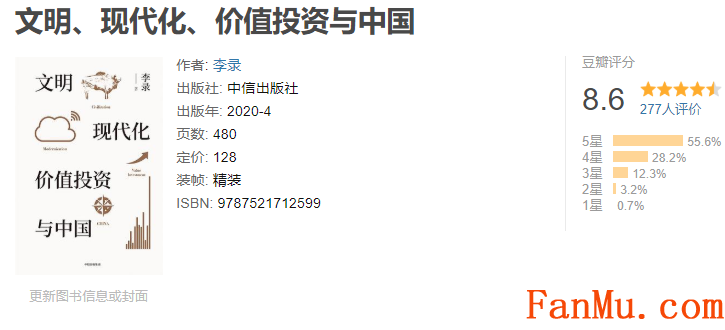

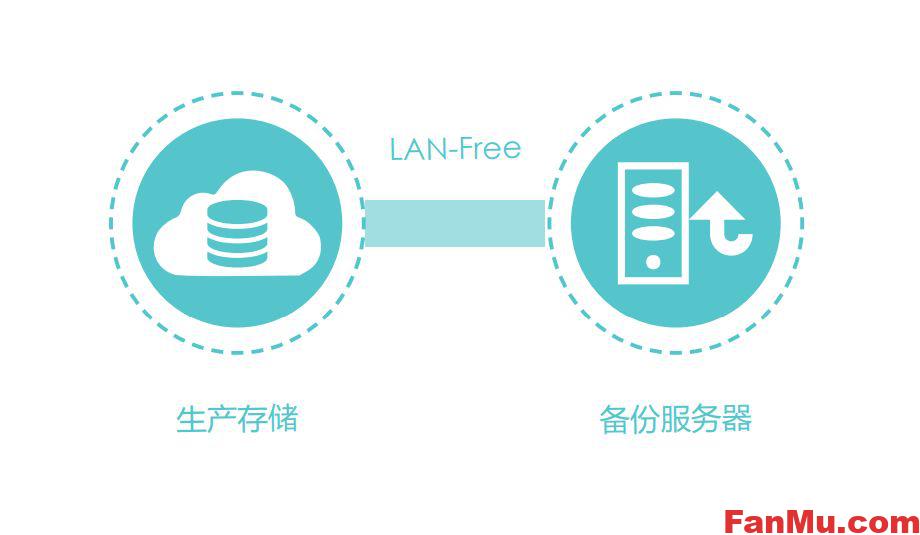




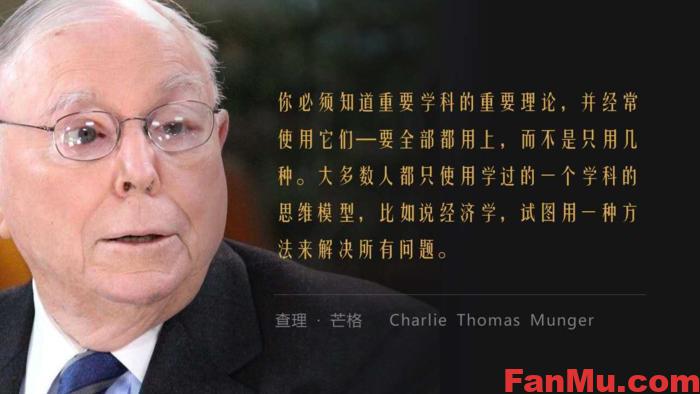

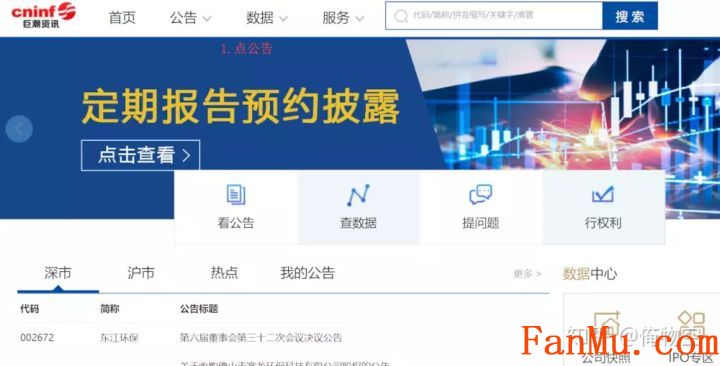



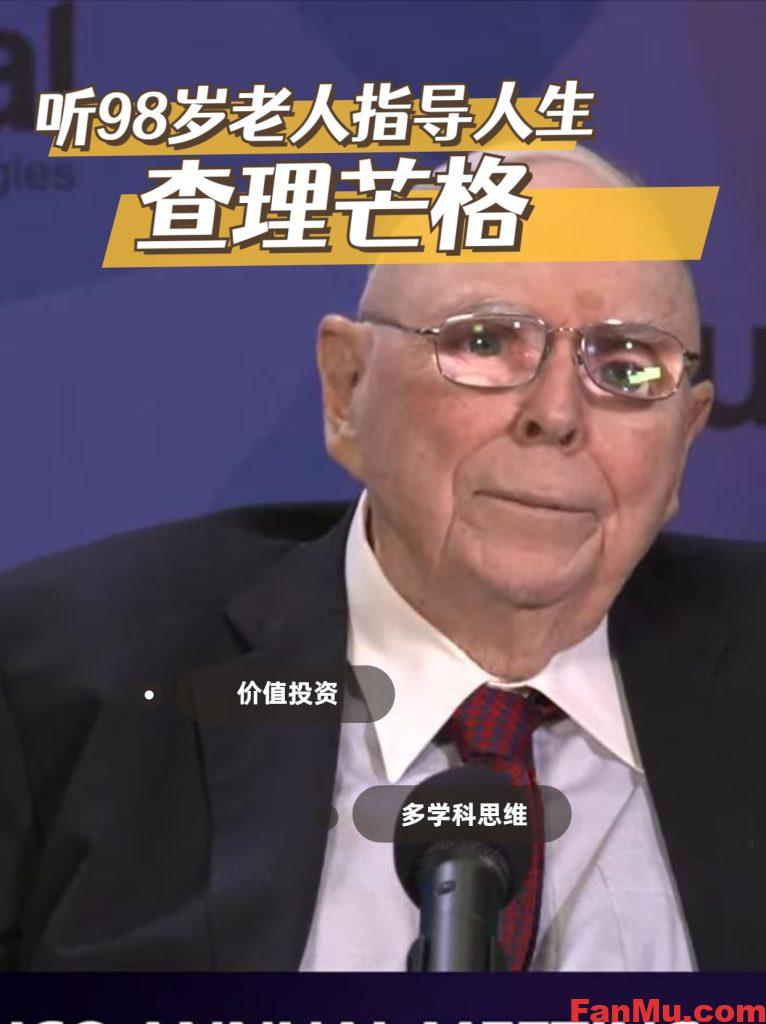
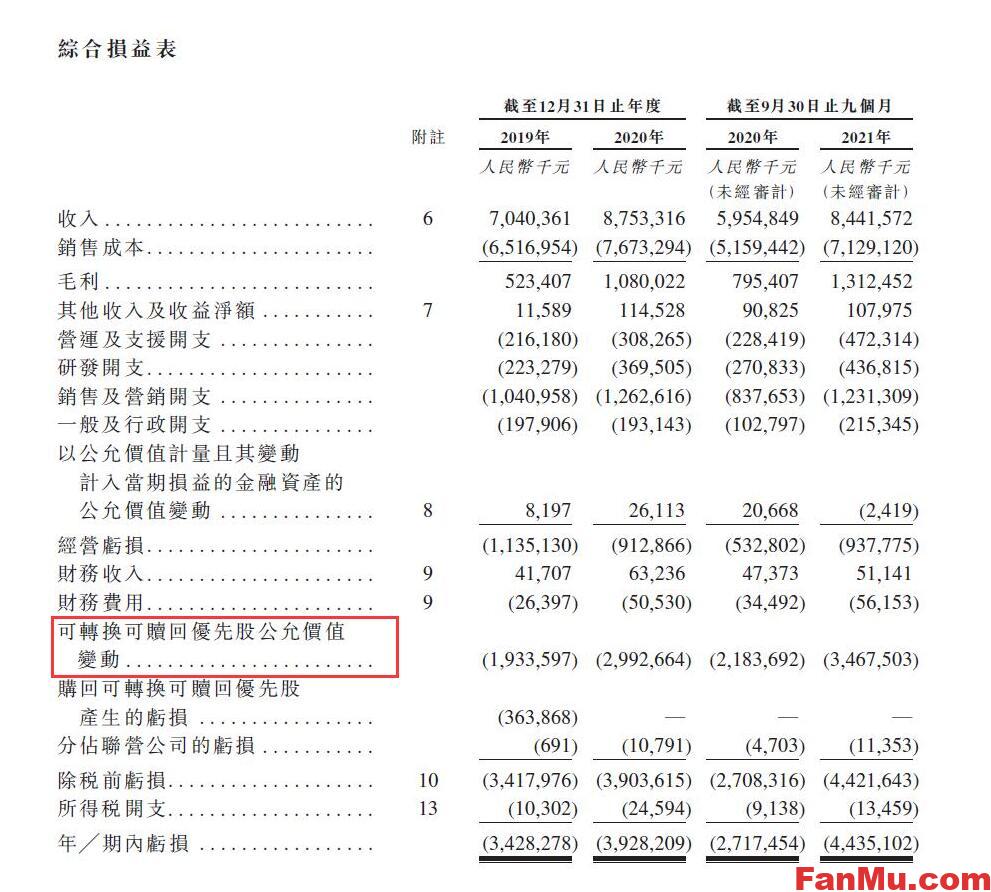


暂无评论内容